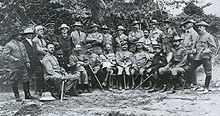Max Hoffmann - Picture
More about World War 1

|
|
Max Hoffmann
Place of birth: Homberg (Efze)
Place of death: Bad Reichenhall
Allegiance: German Empire
Service/branch: Army
Years of service: 1887-1918
Rank: General
Battles/wars: World War I
Awards: Pour le Mérite, Iron Cross First class

Picture - Foreign Officiers in the Russo-Japanese War, Hoffman was at the far left of the front row.
Max Hoffmann (January 25, 1869 - July 8, 1927) was a German officer and military strategist during World War I. He is widely regarded as one of the finest staff officers of the imperial period.
Hoffmann was born in Homberg (Efze). He studied at the Prussian Military Academy and joined the Prussian Army in 1887. Hoffmann also attended the Staff College and graduated in 1889. He spent six months in Russia as an interpreter and five years in the Russian section of the General Staff where he became a specialist in Russian affairs and was tasked with trying to determine Russia's plan of attack in the eventuality of war between Germany and Russia. During the Russo-Japanese War, Hoffmann served as Germany's military observer.
At the outbreak of World War I he was the deputy chief of staff of the German Eighth Army stationed in East Prussia. During the opening months of the war the Eighth Army was the only German military unit defending East Prussia from a Russian attack. The remainder of the German Army, as prescribed by the Schlieffen Plan, was massed in the west attempting to gain the decisive victory that would knock France out of the war. The Russian First and Second Armies scored an early victory against the Germans at the Battle of Gumbinnen. The alarmed Eighth Army commander, Maximilian von Prittwitz, ordered the army to retreat to the River Vistula. This would effectively abandon East Prussia to the Russians. Prittwitz was immediately relieved of his command in favour of Paul von Hindenburg and Erich Ludendorff.
In the interim, the two Russian armies had drifted so far apart that neither could come to the aid of the other if it were attacked. Hoffman knew this from intercepted radio messages. He also knew of the deep mutual dislike the two Russian commanders had for each other which would further disincline them to support one another. Hoffmann was then able to devise a plan for an encirclement victory over Alexander Samsonov's Second Army in the south; which Hindenburg quickly put into action upon his arrival, leading to the Battle of Tannenberg. After destroying the Russian Second Army, the Eighth Army turned north and mauled Paul von Rennenkampf's First Army at the First Battle of the Masurian Lakes driving the Russians out of East Prussia for the remainder of the war.
After Hindenburg and Ludendorff returned to Berlin in 1916, Prince Leopold of Bavaria assumed command of all German armies on the Eastern front with Hoffmann (now a General) as his chief of staff. Hoffmann was able to bring all of the forces on the Eastern front (including Austrian units) under his command.
Following the February Revolution the new Russian government under Alexander Kerensky attempted to reinvigorate Russian support for the war by attacking along a broad front. Hoffman withdrew for sixty miles, all the while urging Ludendorff, his former superior during the Tannenburg campaign and now Quartermaster-General, to shift men from the Western Front, claiming he could knock Russia out of the war. In mid-July 1917 six divisions were sent by train from Flanders; using these reinforcements, Hoffmann counter-attacked along the entire front and within a fortnight was entering Riga. This rout fatally weakened Kerensky, led to the Bolshevik seizure of power in Russia, and thus to the collapse of Russian resistance and the Treaty of Brest-Litovsk. In December 1918 he withdrew his forces from the Ober-Ost former frontline to Germany, thus involuntarily preparing the stage for the Polish-Soviet War.
In his post-war memoirs, Hoffmann was critical of the German High Command including Hindenburg and Ludendorff. Hoffmann was resentful that his two superiors had received the credit for the victories of Tannenberg and the Masurian Lakes when it was really his strategy that allowed the victories to occur. A few years after the war, when touring the field at Tannenberg, Hoffmann told a group of army cadets "See - this is where Hindenburg slept before the battle, this is where Hindenburg slept after the battle, and this is where Hindenburg slept during the battle."
Hoffmann died at Bad Reichenhall on July 8, 1927.
More aircraft.
Source: WikiPedia